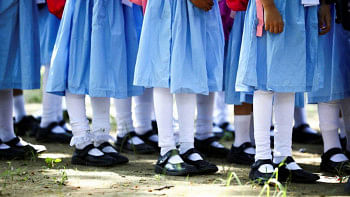Ending corporal punishment needs a change in mindset

Writing repeatedly on ending corporal punishment of children makes me sad. I feel upset that we still have to advocate that hitting children is unacceptable, because treating children with respect and dignity should be common practice. But we have to continue the campaign, as corporal punishment is still the most common and accepted form of violence against children. In 2017, it was estimated that worldwide, more than 1.3 billion children aged between one and 14 years are subjected to corporal punishment at home each year.
Corporal punishment comprises any punishment in which physical force is used and intended to cause some degree of pain or discomfort—however light—as well as other non-physical forms of punishment that are also cruel and degrading. Corporal punishment violates children's human dignity and physical integrity, and is a blatant violation of their rights under the United Nations Convention on the Rights of the Child.
According to Global Partnership to End Violence Against Children, "The evidence is now overwhelming—more than 300 studies show associations between corporal punishment and a wide range of negative outcomes, while no studies have found evidence of any benefits."
Huge amount of scientific research has clearly demonstrated the negative outcomes of corporal punishment, which affects children's physical and psychological health, cognitive development and education, and also damages parent-child relationship. Being subjected to violent punishment increases the likelihood of aggression and bullying in childhood, and of being a perpetrator of violence including domestic violence, anti-social and criminal behaviour in later life. Individuals who experienced corporal punishment as children are more likely to inflict it on their own children when they grow up. If societies continue to allow corporal punishment of children, then it will become impossible to break the intergenerational cycle of violence.
Despite popular belief, corporal punishment is ineffective as a technique to educate and discipline children. When faced with punishment, children may comply with the instructions given by their parents or teachers in the short term, without actually understanding why something should be done or avoided. Instead of punishment, parents should give age-appropriate guidance to their children with care and love, which will help the children in their learning and development. Teachers should also apply positive discipline techniques while interacting with children.
Even though we know that corporal punishment is so harmful for children, it still remains in practice around the world. Across the world, 65 countries have enacted laws banning corporal punishment of children in all settings, which includes homes, schools, workplaces, institutions, alternative care arrangements, etc. Bangladesh is yet to include itself in the list.
When we have a legal system which states that assaulting an adult is an offence, but assaulting a child is acceptable, the law is discriminating against the child and there is no equality under the law. Laws which allow adults to inflict violence on children in the name of "discipline" represent a view of children as subordinate to adults who are possessions of their parents rather than people in their own right. This must change.
In Bangladesh, the Ministry of Education issued a circular in 2011 that prohibited corporal punishment in educational institutions. Yet, corporal punishment is still pervasive in schools and madrasas due to weak monitoring and our general acceptance of this practice. Not just in educational settings, children are subjected to corporal punishment at home, in institutions and workplaces as well. According to the Multiple Indicator Cluster Survey, 2019, carried out by Bangladesh Bureau of Statistics and Unicef, 89 percent of children (1-14 years) in Bangladesh experienced violent discipline in the month prior to the survey. Meanwhile, 35 percent of parents or caregivers expressed that corporal punishment was necessary to discipline children.
From my experience of working on child rights in various countries including Bangladesh, Papua New Guinea, Liberia, I know that any initiative on full legal prohibition of corporal punishment is met with resistance by parents, teachers, community members, and policy makers. Many adults say that beatings by parents and teachers have been going on for a long time, and this is common across societies. However, no social norm can be justified in the name of "tradition" if that hurts a human being.
Some adults mention that many parents are bringing up their children in challenging conditions, and teachers are under stress from overcrowding and lack of resources, and that is why they use corporal punishment. Corporal punishment is often an outlet for the frustrations of adults in their personal and professional lives rather than an attempt to educate children. In many homes and institutions, the truth is that adults need more resources and support. At the same time, hitting children is not acceptable even when adults face difficulties.
Legal reform has led to reduced acceptance of corporal punishment among parents and other members of society. This has been the case in Sweden, Finland, Germany, New Zealand, Poland, and Romania. Evidence suggests that it is possible to change individual and societal acceptance of violence by passing laws, supporting positive parenting programmes, changing norms and behaviour, and ending corporal punishment in schools.
In 2015, the world made a commitment to end violence against children by 2030. Every country signed up to Sustainable Development Goal (SDG) target 16.2, pledging to end exploitation, trafficking, torture and all violence against children. Ending all corporal punishment is a must to achieve this target.
For Bangladesh, it is about time that we enact a new law prohibiting corporal punishment of children in all settings. To make it possible for such a law to be successful, we need to develop the capacity of parents and teachers on non-violent forms of parenting and teaching methods. Social acceptance for this needs to be built by launching public awareness campaigns on the importance of ending corporal punishment. The training of all those who work with or for children and families, as well as in health, education, and social services must include messages on positive discipline.
The government needs to commit to measuring the progress of these initiatives by including SDG indicator 16.2.1 (proportion of children aged 1-17 years who experienced any physical punishment and/ or psychological aggression by caregivers in the past month) in national statistical programmes. Policymakers need to engage with children, and respect their views in all aspects of preventing and responding to corporal punishment.
Laila Khondkar is an international development worker.
Views expressed in this article are the author's own.
Follow The Daily Star Opinion on Facebook for the latest opinions, commentaries and analyses by experts and professionals. To contribute your article or letter to The Daily Star Opinion, see our guidelines for submission.

 For all latest news, follow The Daily Star's Google News channel.
For all latest news, follow The Daily Star's Google News channel. 












Comments